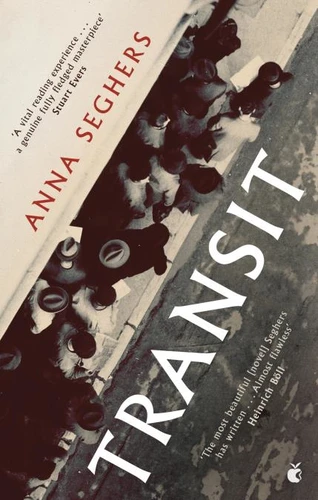Transit
Par :Formats :
Disponible dans votre compte client Decitre ou Furet du Nord dès validation de votre commande. Le format ePub protégé est :
- Compatible avec une lecture sur My Vivlio (smartphone, tablette, ordinateur)
- Compatible avec une lecture sur liseuses Vivlio
- Pour les liseuses autres que Vivlio, vous devez utiliser le logiciel Adobe Digital Edition. Non compatible avec la lecture sur les liseuses Kindle, Remarkable et Sony
- Non compatible avec un achat hors France métropolitaine
 , qui est-ce ?
, qui est-ce ?Notre partenaire de plateforme de lecture numérique où vous retrouverez l'ensemble de vos ebooks gratuitement
Pour en savoir plus sur nos ebooks, consultez notre aide en ligne ici
- Nombre de pages288
- FormatePub
- ISBN978-0-349-01469-2
- EAN9780349014692
- Date de parution01/12/2021
- Protection num.Adobe DRM
- Infos supplémentairesepub
- ÉditeurVirago
- TraducteurMargot Bettauer Dembo
Résumé
INTRODUCED BY STUART EVERS: 'A genuine, fully fledged masterpiece of the twentieth century; one that remains just as terrifyingly relevant and truthful in the twenty-first'An existential, political, literary thriller first published in 1944, Transit explores the plight of the refugee with extraordinary compassion and insight. Having escaped from a Nazi concentration camp in Germany and a work camp in Rouen, the nameless narrator finds himself in the dusty seaport of Marseille.
Along the way he was asked to deliver a letter to Weidel, a writer in Paris whom he discovered had killed himself as the Nazis entered the city. Now he is in search of the dead man's wife. He carries Weidel's suitcase, which contains an unfinished novel - and a letter securing Weidel a visa to escape France. Assuming the name Seidler - though the authorities think he is in fact Weidel - he goes from cafe to cafe looking for Marie, who is in turn anxiously searching for her husband.
As Seidler converses with refugees over pizza and wine, their stories gradually break down his ennui, bringing him a deeper awareness of the transitory world they inhabit as they wait and wait for that most precious of possessions: transit papers.'This novel, completed in 1942, is in my opinion the most beautiful Seghers has written .
Along the way he was asked to deliver a letter to Weidel, a writer in Paris whom he discovered had killed himself as the Nazis entered the city. Now he is in search of the dead man's wife. He carries Weidel's suitcase, which contains an unfinished novel - and a letter securing Weidel a visa to escape France. Assuming the name Seidler - though the authorities think he is in fact Weidel - he goes from cafe to cafe looking for Marie, who is in turn anxiously searching for her husband.
As Seidler converses with refugees over pizza and wine, their stories gradually break down his ennui, bringing him a deeper awareness of the transitory world they inhabit as they wait and wait for that most precious of possessions: transit papers.'This novel, completed in 1942, is in my opinion the most beautiful Seghers has written .
INTRODUCED BY STUART EVERS: 'A genuine, fully fledged masterpiece of the twentieth century; one that remains just as terrifyingly relevant and truthful in the twenty-first'An existential, political, literary thriller first published in 1944, Transit explores the plight of the refugee with extraordinary compassion and insight. Having escaped from a Nazi concentration camp in Germany and a work camp in Rouen, the nameless narrator finds himself in the dusty seaport of Marseille.
Along the way he was asked to deliver a letter to Weidel, a writer in Paris whom he discovered had killed himself as the Nazis entered the city. Now he is in search of the dead man's wife. He carries Weidel's suitcase, which contains an unfinished novel - and a letter securing Weidel a visa to escape France. Assuming the name Seidler - though the authorities think he is in fact Weidel - he goes from cafe to cafe looking for Marie, who is in turn anxiously searching for her husband.
As Seidler converses with refugees over pizza and wine, their stories gradually break down his ennui, bringing him a deeper awareness of the transitory world they inhabit as they wait and wait for that most precious of possessions: transit papers.'This novel, completed in 1942, is in my opinion the most beautiful Seghers has written .
Along the way he was asked to deliver a letter to Weidel, a writer in Paris whom he discovered had killed himself as the Nazis entered the city. Now he is in search of the dead man's wife. He carries Weidel's suitcase, which contains an unfinished novel - and a letter securing Weidel a visa to escape France. Assuming the name Seidler - though the authorities think he is in fact Weidel - he goes from cafe to cafe looking for Marie, who is in turn anxiously searching for her husband.
As Seidler converses with refugees over pizza and wine, their stories gradually break down his ennui, bringing him a deeper awareness of the transitory world they inhabit as they wait and wait for that most precious of possessions: transit papers.'This novel, completed in 1942, is in my opinion the most beautiful Seghers has written .















